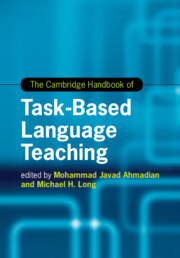Book contents
- The Cambridge Handbook of Task-Based Language Teaching
- Cambridge Handbooks In Language And Linguistics
- The Cambridge Handbook of Task-Based Language Teaching
- Copyright page
- Dedication
- Contents
- Figures
- Tables
- Contributors
- Preface The Origins and Growth of Task-Based Language Teaching
- Part I The Rationale for Task-Based Language Teaching
- Part II Tasks and Needs Analysis
- Part III The Task Syllabus and Materials
- Part IV Methodology and Pedagogy
- Part V Task-Based Language Teaching with School-Age Children
- Part VI The Teacher in Task-Based Language Teaching
- 12 Teacher Preparation and Support for Task-Based Language Teaching
- 12A Connecting Teacher Training to Task-Based Language Teaching Implementation
- 12B Training for Tasks the Cooperative Way
- Part VII Task-Based Assessment and Program Evaluation
- Part VIII Research Needs and Future Prospects
- Index
- References
12B - Training for Tasks the Cooperative Way
An Online Tutored Task-Based Language Teaching Course for Teachers, Managers and Course Designers
from Part VI - The Teacher in Task-Based Language Teaching
Published online by Cambridge University Press: 19 November 2021
- The Cambridge Handbook of Task-Based Language Teaching
- Cambridge Handbooks In Language And Linguistics
- The Cambridge Handbook of Task-Based Language Teaching
- Copyright page
- Dedication
- Contents
- Figures
- Tables
- Contributors
- Preface The Origins and Growth of Task-Based Language Teaching
- Part I The Rationale for Task-Based Language Teaching
- Part II Tasks and Needs Analysis
- Part III The Task Syllabus and Materials
- Part IV Methodology and Pedagogy
- Part V Task-Based Language Teaching with School-Age Children
- Part VI The Teacher in Task-Based Language Teaching
- 12 Teacher Preparation and Support for Task-Based Language Teaching
- 12A Connecting Teacher Training to Task-Based Language Teaching Implementation
- 12B Training for Tasks the Cooperative Way
- Part VII Task-Based Assessment and Program Evaluation
- Part VIII Research Needs and Future Prospects
- Index
- References
Summary
This case study discusses an online second language teacher education course, designed for teachers, teacher educators, directors of studies and course designers, created and run by the authors, who are both members of a language services cooperative in Barcelona. Information about the cooperative is given, and the events leading to the start of the project are described. Having outlined Long’s (2015) approach to task-based language teaching (TBLT), which serves as the model for the course, we describe the course itself, and the components of its twelve sessions. We go on to explain how we wrote the course and how, once complete, it was marketed. The First implementation of the course is then described, including details of the participants’ working roles; their highest qualifications; their engagement with course activities; the completion rates; and feedback. We then explain how the second implementation reflected changes we made to the course as a result of our reflections and feedback. Finally, we discuss the strengths and weaknesses of the course, paying particular attention to loop input (Woodward, 2003) and to the principle of faithfully reflecting TBLT processes so that the course practices what it preaches.
Keywords
- Type
- Chapter
- Information
- The Cambridge Handbook of Task-Based Language Teaching , pp. 478 - 493Publisher: Cambridge University PressPrint publication year: 2021

